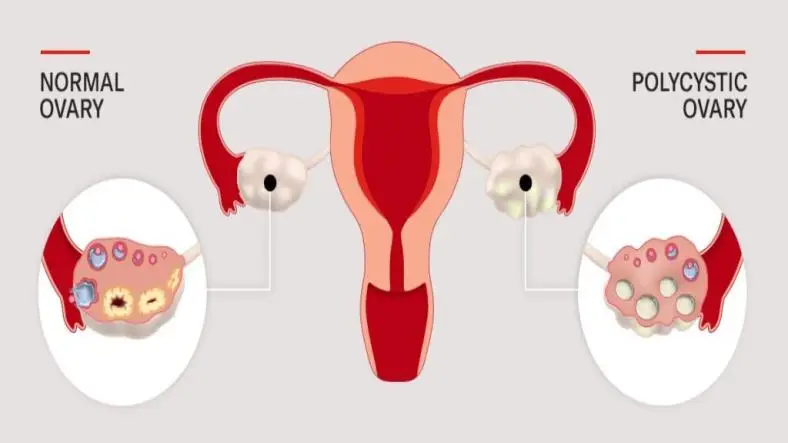PCOS is recognized as a common endocrine disorder affecting women of reproductive age, with significant advancements in its diagnosis, treatment and management aimed at improving quality of life and long-term health outcomes.
PCOS is a hormonal disorder characterized by a combination of symptoms including irregular periods, elevated androgen levels and the presence of multiple small ovarian cysts. In comparison to normal ovaries, ovaries affected by PCOS typically exhibit a higher number of small follicles, irregular follicle development and associated hormonal imbalances. Proper diagnosis and management often involve a combination of clinical evaluation, ultrasound imaging and hormonal assessments.
Normal Ovary vs PCOS Ovary
Normal Ovary
- Appearance: Smooth surface; follicles at different stages of development.
- Follicles: A few follicles; one matures and ovulates each cycle.
- Size and Shape: Typically 3-5 cm; regular in shape.
- Hormones: Balanced levels; regular estrogen and progesterone production.
- Menstrual Cycles: Regular, about 28 days; ovulation occurs mid-cycle.
PCOS Ovary
- Appearance: Thicker, sometimes irregular surface; "string of pearls" pattern on ultrasound.
- Follicles: Multiple small follicles (usually >12) around the edge; do not mature properly.
- Size and Shape: Can be slightly enlarged; thicker outer layer.
- Hormones: Elevated androgens; often insulin resistance.
- Menstrual Cycles: Irregular or absent periods; disrupted ovulation.
Symptoms:
- Irregular menstrual cycles: Infrequent, irregular, or prolonged menstrual periods.
- Excess androgen: Elevated levels of male hormones causing hirsutism (excess facial and body hair), severe acne and male-pattern baldness.
- Polycystic ovaries: Enlarged ovaries containing numerous small cysts.
- Weight gain: Especially around the abdomen.
- Darkening of the skin: Especially in body creases like those on the neck, groin and under the breasts (acanthosis nigricans).
- Thinning hair: On the scalp.
- Infertility: Difficulty in conceiving due to irregular ovulation.
Causes:
- Hormonal imbalance: Excess insulin and androgens disrupt normal ovarian function.
- Genetics: Family history of PCOD or PCOS can increase risk.
- Low-grade inflammation: May contribute to the condition by stimulating polycystic ovaries to produce androgens.
- Lifestyle factors: Poor diet, lack of physical activity and obesity can exacerbate symptoms.
Diagnosis:
- Medical history and physical examination: Assessing symptoms and family history.
- Pelvic exam: Checking for enlarged ovaries or clitoral enlargement.
- Blood tests: Measuring hormone levels (androgens, insulin, thyroid hormones and others).
- Ultrasound: Imaging to detect cysts on the ovaries and assess their size and number.
Treatment:
- Lifestyle changes: Weight loss through a healthy diet and regular exercise can improve symptoms.
Medications:
- Hormonal contraceptives: To regulate menstrual cycles and reduce androgen levels.
- Anti-androgens: To reduce hair loss, acne and excess hair growth.
- Metformin: To manage insulin resistance.
- Fertility treatments: Such as clomiphene citrate, letrozole, or assisted reproductive technologies for those trying to conceive.
- Cosmetic treatments: For hair removal and acne management.
Recovery and Management:
- Regular follow-ups: Ongoing monitoring with a healthcare provider to adjust treatments as necessary.
- Healthy lifestyle: Maintaining a balanced diet, regular physical activity and healthy weight.
- Support: Joining support groups or seeking counseling can help cope with emotional and psychological aspects.
- Medication adherence: Consistent use of prescribed medications to manage symptoms effectively.
- Education: Understanding the condition and its impact can empower individuals to take an active role in managing their health.
Prognosis
PCOD is a chronic condition but can be effectively managed with lifestyle changes and medical treatment. Early intervention and consistent management can improve symptoms, reduce complications and enhance quality of life.
Thanks for reading the article, for more health related articles read our peoples blog articles.














